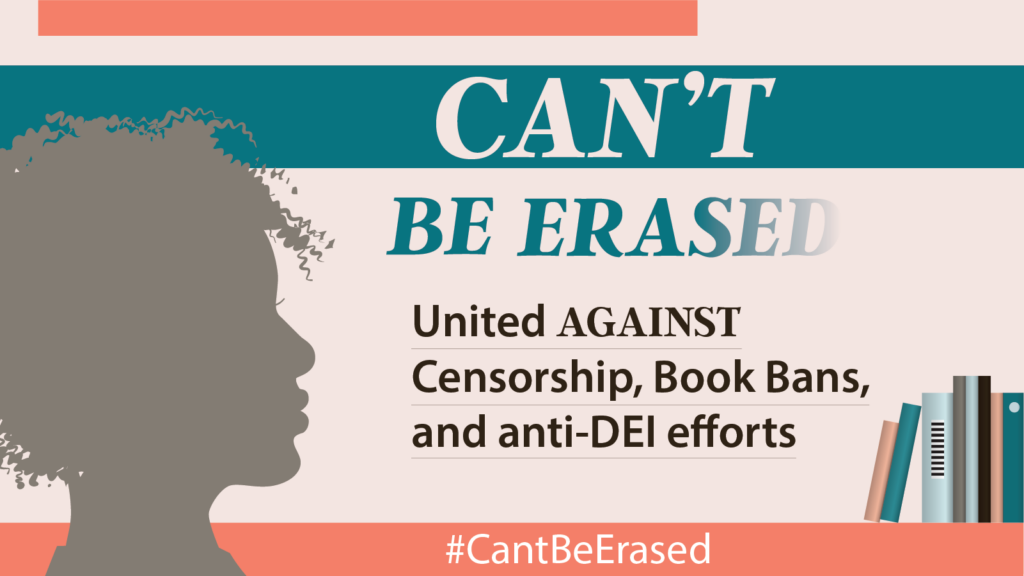Can’t Be Erased Campaign Toolkit
At the state and local level, decision-makers across the country continue to issue book bans and look for other means to restrict students’ access to honest history and a diversity of voices.

On the national stage, the new administration vows to “end wokeness.” At the state and local level, decision-makers across the country continue to issue book bans and look for other means to restrict students’ access to honest history and a diversity of voices. Black and Latino stories are being erased from school curricula. LGBTQ+ voices are being silenced. Students are being harassed and bullied for being who they are.
More than half of students are students of color, so they are already in dire need of more racial and cultural representation in curriculum. And yet, everything from books and instructional materials to statewide assessments enforces a predominantly white culture. This threatens not only students’ academic growth but also their ability to understand diverse cultures both in the U.S. and the world around them.
On the higher ed front, diversity, equity, and inclusion (DEI) programs are being dismantled in colleges and universities around the country. This affects the campus racial climate, the ability to create safe spaces, and feel a sense of belonging — all of which impact students of color’s mental health.
Well, EdTrust has a message:
Black and Latino history is American history.
Black and Latino culture can’t be erased.
Diverse voices and identities can’t be erased.
As advocates for equity and justice, we must:
Full stop: America is a diverse country, regardless of what any racist or detractor may say or want. Our nation’s students deserve a high-quality education and to feel a sense of belonging in their learning environments — from preschool to college — so they can succeed in an increasingly multicultural world. Let’s give them a better world to live in. Because when we protect students, we protect democracy.
EdTrust is proud to join forces with We Believe and PEN America in the fight for our children’s freedom to read and learn. And we need your support to ensure our political leaders hear our resounding message. Here’s how you can help: Send a letter to your state leaders urging them to support the freedom to read and learn. All you need to do is fill out the form and click send to email your state legislator, but we encourage you to add your personal touch and share your story.
Sign onRALLY designed a messaging guide to help advocates speak to their local, state and federal legislators, when opposing book bans and censorship.
Read the guideBook and curriculum censorship efforts are increasing across the nation, so it’s important to be prepared in case a challenge occurs in your community. Unite Against Book Bans developed this guide to help organize against attempted book bans at the local level.
Read the guideThe National Coalition Against Censorship (NCAC) provides a book challenge resource center that includes resources for authors of challenged books, guidelines for school officials, parents, and students who need to respond to book challenges, a guide for defending LGBTQ stories, and in partnership with the National Council of Teachers of English (NCTE), a handbook for educators and librarians navigating book challenges.
Access the resource centerThe nation is experiencing a literacy crisis and historic drops in student achievement. Better racial and ethnic representation in our classroom books will help all students achieve. Our study outlines why we need to redress representational balance in school curricula.
Representation has long been imbalanced in school curriculum. We created the Tool for Representational Balance in Books to provide curriculum publishers, students, parents, teachers, advocates, and community members with a framework for closely reviewing the books that make up curricular units so they may better understand how people, groups, and topics are represented.
It’s time to decenter Whiteness from standardized test design. Today, most statewide assessments avoid questions and passages that allude to cultural topics or themes on the grounds of fairness and colorblindness. This guide is designed to help advocates push their state leaders to insist on racially and culturally inclusive statewide assessments.
Threats to diversity, equity, and inclusion (DEI) are growing stronger in Higher Ed institutions across the nation, with plans by various states to introduce anti-DEI bills and continued attacks on academia. We created an interactive map to keep track of the evolving attacks on DEI across the states.
An essential conversation on how to push back against efforts to suppress the teaching of honest history and diversity of identities and ideas.
This training gives an overview of findings and recommendations from EdTrust’s The Search for More Complex Racial and Ethnic Representation report and will dive deep into how to use our Tool for Representational Balance in Books. We want to support advocates in using this tool to advocate at any level for the representation deeply needed in our students’ classrooms and libraries.